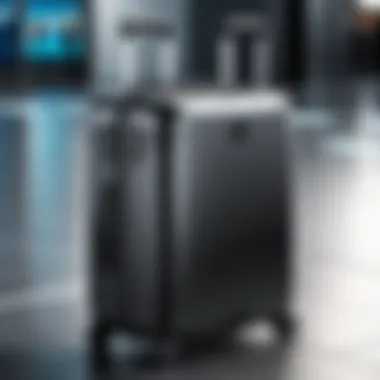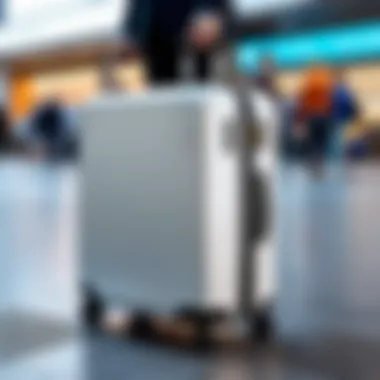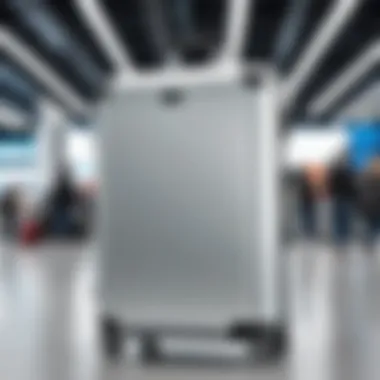Exploring Smart Luggage: The Future of Travel


Intro
The luggage industry has seen a significant transformation in recent years. Smart luggage represents a pivotal shift that merges technology with a traditional travel necessity. This article will explore the intricate layers of smart luggage, aiming to provide tech-savvy individuals and industry professionals with a comprehensive understanding of this emerging sector. Key components such as features, performance, and future trends will be dissected in detail, revealing their implications for modern travel.
Features Overview
Smart luggage includes innovative technological advancements that enhance both user convenience and security. These features go beyond simple design improvements and serve to integrate mobile connectivity and advanced tracking abilities into portable storage solutions.
Key Specifications
Smart luggage typically includes the following specifications:
- Built-in GPS Tracking: This helps users locate their luggage in real-time, minimizing the risk of loss.
- Weight Sensors: These indicate when luggage exceeds the allowable limit, thus avoiding fees at the airport.
- Integrated Power Bank: Many models offer charging ports for electronic devices, allowing travelers to stay connected on the go.
- Bluetooth Connectivity: This enables users to interact with their luggage through smartphone apps, facilitating updates and notifications.
Unique Selling Points
The value propositions of smart luggage are distinct:
- User Experience: Intuitive apps and easy-to-use interfaces enhance the travel journey.
- Security Features: From tamper alerts to remote locking systems, these innovations offer a peace of mind.
- Sustainability: Some brands focus on eco-friendly materials, appealing to environmentally conscious consumers.
"Smart luggage is not merely about carrying items but also about elevating the travel experience through seamless integration of technology."
Performance Analysis
An examination of smart luggage performance reveals insights into its efficiency under various conditions, illustrating its value in real-world applications.
Benchmarking Results
Tests typically performed on various smart luggage models highlight the following outcomes:
- Tracking Accuracy: Most devices function effectively within the set Bluetooth range. In some cases, app responses to location changes can occur within seconds.
- Battery Life: Charging capabilities last anywhere from a few hours to several days, depending on usage.
- Durability: Most brands offer high resilience to impact, but the material composition varies and affects long-term reliability.
Real-world Scenarios
Consider a traveler navigating through a busy airport. With smart luggage, the user can effortlessly keep track of their belongings through their smartphone. Real-time updates can prevent stressful situations related to lost luggage, enhancing overall efficiency in traveling. Another example could be a business traveler who utilizes the power bank feature to ensure that their devices remain charged during lengthy layovers or between important meetings.
With this growing trend, it is essential to consider how the evolution of luggage technology impacts the overall travel experience. Future prospects appear promising as more companies invest in this sector, paving the way for smarter, more connected trips.
Prelude to Smart Luggage
In recent years, the concept of smart luggage has emerged as a significant innovation within the travel industry. As travelers become more reliant on technology, the integration of smart features in luggage reflects a broader trend towards enhancing efficiency and convenience in modern travel. Smart luggage typically incorporates technology that not only facilitates easier travel but also addresses common challenges faced by globetrotters. This article aims to provide an insightful analysis of the various aspects of smart luggage, from its defining characteristics to the technological advancements embedded within.
Definition of Smart Luggage
Smart luggage can be delineated as any travel bag that integrates advanced technology to improve the overall travel experience. This may include features such as GPS tracking, built-in charging ports, and remote locking systems. These elements work in conjunction to offer travelers greater control over their belongings while enhancing security. For instance, the incorporation of tracking systems allows users to monitor the location of their luggage in real time, addressing the persistent issue of lost bags in transit. Other features may range from weight sensors to alert travelers if their bag exceeds airline restrictions, reinforcing the practical utility of smart luggage.
Historical Context and Evolution
The evolution of smart luggage traces back to the increasing intersection of technology and travel needs. Initially, travel bags served a straightforward purpose: to carry personal items from one location to another. However, as travel technology progressed, there arose a need to improve functionality and security. The introduction of RFID tags in the early 2000s marked an initial step towards smarter luggage. These tags enabled travelers to track their bags and enhanced the overall management in airports.
Over the past decade, advancements in wireless technology and smartphone integration spurred significant improvements. As smart technology transitioned from smartphones to everyday items, the luggage industry adapted accordingly. The smart luggage market has now expanded to include brands like Away and Raden, which pioneered innovations such as app integration and biometric locks. As travel continues to evolve post-pandemic, these developments reflect a rising expectation for functionality and connectivity in travel gear, making smart luggage an essential component of contemporary travel.
Technological Features of Smart Luggage
Understanding the technological features of smart luggage is essential in grasping its role in modern travel. This section will delve into various cutting-edge elements, focusing on their benefits and considerations that travelers need to keep in mind when selecting smart luggage.


Integrated Power Sources
One of the critical technological advancements in smart luggage is the integrated power source. Many smart luggage pieces come equipped with built-in USB ports, allowing travelers to charge their devices on the go. This feature eliminates the constant search for power outlets in airports or train stations, enhancing the travel experience significantly.
However, it is essential to consider safety and airline regulations concerning lithium batteries, which are commonly used in these power systems. It has been noted that oversized or faulty batteries can lead to hazardous situations, particularly during air travel. Thus, manufacturers must comply with safety standards, ensuring the batteries are reliable and secure.
Tracking Systems
Tracking systems are another hallmark of smart luggage. These systems use GPS and Bluetooth technology to allow travelers to monitor the location of their bags in real-time. This capability is particularly useful during layovers or when checking bags, as travelers can know the exact position of their luggage, reducing anxiety related to lost or delayed bags.
Tracking systems also foster more profound engagement between travelers and their belongings. When a traveler's luggage is misplaced, they can use their smartphones to find it, provided the luggage remains powered. This highlights the intersection between technology and customer service in the travel industry.
Remote Locking Mechanisms
Remote locking mechanisms further enhance the security aspect of smart luggage. This feature often utilizes a mobile application, enabling users to lock or unlock their bags from their smartphones. This convenience surely appeals to tech-savvy travelers, but it also demands a conversation about potential vulnerabilities.
There have been concerns regarding hacking and unauthorized access, which could compromise the security of personal items. Manufacturers need to implement robust encryption methods and continuous software updates to address these vulnerabilities effectively.
Weight Sensors
Lastly, weight sensors integrated into smart luggage can prevent overpacking and associated extra fees. Travelers can weigh their bags using built-in scales before acting. This feature saves both time and money, offering a practical solution to a common issue faced by many travelers.
Understanding the limitations of these sensors is vital, however. Factors such as uneven weight distribution can affect accuracy, leading to possible surprises during check-in.
In summation, the technological features of smart luggage not only aim to enhance user convenience but also present new challenges. Knowing how to utilize these features strategically can transform the travel experience for individuals, particularly for information technology professionals and tech enthusiasts who seek efficiency in their journeys.
Advantages of Using Smart Luggage
Smart luggage is gaining popularity among travelers for its various benefits. These advantages not only enhance the travel experience but also address common pain points associated with traditional luggage. Understanding these benefits is crucial for both consumers and industry professionals. This section explores key advantages, focusing on enhanced security, convenience for travelers, mobile app integration, and real-time alerts.
Enhanced Security
One of the primary advantages of smart luggage is its enhanced security features. Many models come equipped with remote locking mechanisms and GPS tracking systems. These features help users locate their bags if they are lost or stolen. For instance, connected devices can send location data to a mobile app. This makes it easier for travelers to monitor their luggage at all times.
"The integration of technology in luggage has transformed how we manage our travel essentials. Security is no longer a negligible aspect."
In addition to tracking, some smart luggage includes biometric locks. These locks require fingerprints to unlock, further reducing the risk of theft. The ability to secure one's bag with technology brings peace of mind, especially in crowded airports.
Convenience for Travelers
Smart luggage offers significant convenience that traditional options cannot match. Integrated power sources allow travelers to charge their devices while on the move. This feature is particularly beneficial for long journeys. Imagine having your phone or tablet easily charged without the hassle of searching for an outlet.
Moreover, the lightweight design of many smart luggage products ensures effortless maneuverability. Features such as automatic wheels can even follow the traveler, reducing physical strain. This level of convenience allows users to focus on their trip rather than their luggage.
Integration with Mobile Apps
The seamless integration of smart luggage with mobile apps enhances the overall travel experience. Users can manage their luggage through an app, providing real-time updates on location and battery levels.
Such integration fosters an ecosystem where passengers can receive notifications directly from their bags. For example, an app can send alerts if the weight exceeds airline limits, helping to avoid extra fees at the check-in counter. This technology not only saves time but also minimizes stress.
Real-Time Alerts
Real-time alerts are another compelling advantage of smart luggage. Advanced sensors can detect when a bag is moved unexpectedly or misplaced. When this happens, the owner receives instant notifications on their smartphone. Such alerts aid in quickly recovering lost belongings.
These alerts can be setup for high-security bags, prompting alerts to warn the owner if their bag is opened unexpectedly. This capability provides a higher level of vigilance against theft and loss.
Challenges and Limitations


In evaluating smart luggage, it is essential to address the challenges and limitations that can affect both users and manufacturers. Recognizing these factors is not just beneficial but crucial for understanding how smart luggage fits within modern travel environments. While technological advancements offer many conveniences, they may also present potential drawbacks, impacting user experience and overall value.
Durability and Reliability
Durability and reliability are paramount, especially for luggage that will be subjected to various stresses during travel. Smart luggage often integrates sophisticated tech features like batteries, tracking devices, and sensors. These components can be vulnerable to wear and tear. In real-world situations, harsh handling by airport personnel or exposure to extreme environmental conditions can potentially compromise these technologies. Users often report issues ranging from batteries failing after only a few uses to tracking devices becoming unreliable.
Ensuring durability means manufacturers need to invest in robust materials and rigorous testing to align their products with customers' demands for longevity. Without this, despite high-tech features, users may opt for traditional, more reliable luggage.
Cost Considerations
The introduction of smart luggage comes with a higher price tag compared to standard travel bags. The investment can be substantial, with some models ranging into the hundreds of dollars. This raises important considerations for travelers. On one hand, the benefits, such as integrated charging ports and tracking capabilities, could justify the cost. However, potential buyers may hesitate when weighing these benefits against the possibility that they only use these features infrequently.
Additionally, as technology evolves, there could be concerns about obsolescence. Users may worry that purchasing a high-priced smart luggage model could mean an inadequate return on investment as more advanced options become available. Regular updates or features could lead to systems being outdated faster than traditional luggage, making cost a significant factor in purchasing decisions.
Privacy Concerns
Privacy is a growing concern as smart luggage generally includes tracking capabilities. Users often need to connect their luggage to mobile apps, raising questions related to data security and user privacy. The collection of data, even for beneficial purposes, can lead to vulnerabilities. If a tracking system is hacked, it could pose risks to the traveler, as their luggage's precise location might be accessed by unauthorized individuals.
Moreover, how companies manage personal data can influence purchasing decisions. Companies need stringent privacy policies in place to reassure travelers that their data is secure and not being misused. Without trust in these systems, the potential advantages offered by smart luggage can be overshadowed by fear of privacy invasions.
Addressing these challenges effectively is crucial to positioning smart luggage as a viable option for today's tech-savvy travelers.
In summary, the durability and reliability of smart luggage, its cost considerations, and privacy concerns are integral aspects that shape consumer choices. Acknowledging these hurdles not only helps consumers make informed decisions but also motivates manufacturers to innovate and improve their offerings in the competitive travel market.
User Experience and Feedback
User experience plays a pivotal role in the adoption and evaluation of smart luggage. As technology integrates more into everyday items, it is essential to understand how users interact with these innovations. Feedback from customers can provide insights into what functionalities are valued and any challenges faced in real-world applications. The focus on user experience not only helps manufacturers improve their products but also guides potential buyers in their purchasing decisions.
The experience with smart luggage hinges on several factors, including ease of use, reliability of features, and overall satisfaction. Travelers tend to prioritize functionality over complexity. Thus, smart luggage must offer intuitive controls and seamless integration with smart devices. The emphasis on user-centric design is critical for enhancing travel convenience.
Key elements influencing user experience in smart luggage include:
- Accessibility: User interfaces must be understandable and easy to navigate.
- Reliability: Technology should operate consistently without frequent malfunctions.
- Support: Availability of customer service to address user inquiries.
When travelers share their experiences, revealing patterns in their satisfaction or frustration can lead to more informed choices for future buyers and better designs by manufacturers.
Regulatory Considerations in Smart Luggage
The incorporation of smart technologies into everyday items such as luggage brings several regulatory concerns that need attention. It is crucial for safety and consumer protection, especially in the context of air travel where rules are stringent. These regulations exist not only to keep travelers safe but also to ensure that the technological innovations in smart luggage do not create hazards during transit. Understanding these considerations is essential for users, manufacturers, and regulators alike, as they shape how smart luggage is developed and introduced into the market.
TSA and Air Travel Regulations
The Transportation Security Administration (TSA) plays a pivotal role in regulating what can be taken aboard aircraft. Smart luggage, with its embedded technology, must adhere to certain criteria to mitigate risks. Key regulations from the TSA cover:
- Battery Compliance: Smart luggage commonly employs lithium-ion batteries. These batteries can pose a fire risk if damaged or improperly transported. The TSA has guidelines that specify limits on the size and type of batteries allowed. Any baggage with batteries must be compliant with these regulations to ensure safe air travel.
- Security Screening: Travelers may be required to remove electronic components during security checks. This can include taking laptops, tablets, and even some smart luggage out of the bag for separate screening. Understanding how to prepare smart luggage for these common security requirements is essential for a hassle-free travel experience.
- Power Off Requirements: Devices that have active smart features, such as GPS tracking or built-in chargers, may need to be turned off before flights. The TSA enforces these rules to ensure that the electronics do not interfere with flight operations.
Any traveler interested in using smart luggage should be aware of these TSA rules to avoid complications during their journey.
"Regulatory guidelines help ensure that innovative products like smart luggage remain safe and functional for all travelers."
Compliance Standards
Compliance standards serve as a framework within which smart luggage manufacturers are expected to operate. These standards help to ensure the safety and efficiency of smart luggage technology. Key issues include:
- Consumer Electronics Safety: Products must meet established safety standards set by organizations such as Underwriters Laboratories (UL). This includes testing for battery safety, electrical safety, and overall durability, which are critical for items frequently transported in various conditions.
- Privacy Guidelines: As smart luggage often features connected technologies, manufacturers must comply with data privacy laws. This is particularly relevant if the luggage collects or transmits personal data, which could infringe on users' privacy if not managed correctly. Adequate measures must be in place to protect user information.
- Industry-Specific Regulations: Compliance isn't uniform across regions. For example, smart luggage marketed in Europe must comply with the General Data Protection Regulation (GDPR) that governs data protection for European Union citizens.


Given the complexities associated with compliance, manufacturers of smart luggage must invest in understanding and adhering to these emerging standards to successfully navigate the market. As regulatory landscapes evolve, so should the approaches taken by producers in the smart luggage sector.
Market Dynamics and Trends
Understanding market dynamics is crucial when analyzing smart luggage. It encompasses a variety of factors that influence the smart luggage ecosystem, including consumer demand, the technological landscape, and competitive practices.
The increased adoption of smart luggage directly correlates with higher air travel and the growing need for convenience in mobility. As frequent travelers seek solutions that ease their journey, the demand for innovative luggage options continues to rise. This section will provide insight about the integral components shaping the smart luggage market today.
Key Players in the Smart Luggage Market
Several companies lead the smart luggage market, each contributing unique solutions and features. Some prominent players include:
- RIMOWA: Known for its high-end, durable luggage, RIMOWA has entered the smart luggage realm with integrated tracking and charging functionalities.
- Away: This popular brand focuses on sleek, modern designs while incorporating technology like USB charging ports and built-in weight sensors.
- BlueSmart: A pioneer in the smart luggage space, they were one of the first to offer luggage with GPS tracking and remote locking.
- Samsonite: As a long-standing name in luggage, Samsonite offers models with smart capabilities like tracking technology and integrated batteries.
These players highlight the growing trend of merging traditional luggage designs with advanced technology. With competition rising, companies are motivated to innovate in order to differentiate their products.
Emerging Technologies
Emerging technologies in the luggage industry continue to evolve. Smart luggage is not just about tracking or charging; it encompasses a broader array of innovations including:
- Artificial Intelligence: Some luggage now utilizes AI for enhanced functionality, providing travelers with suggestions based on their travel habits.
- IoT Integration: The Internet of Things (IoT) allows smart luggage to connect with other devices, enabling features like real-time monitoring and notifications about luggage status.
- Self-Weighing Mechanisms: Advanced electronic scales can provide immediate weight readings to avoid excess baggage fees at airport check-ins.
The convergence of these technologies signifies a transformative phase in how we view and interact with luggage. The travel experience is reshaped with enhanced connectivity and efficiency.
The focus on technology ensures that smart luggage not only addresses practical travel needs but also provides a glimpse into a future where luggage is more than just a storage tool.
The Future of Smart Luggage
The topic of the future of smart luggage is crucial for understanding how technology continues to shape our travel experiences. As globalization increases and travel becomes more accessible, the demand for innovative solutions in luggage management is rising. This section will explore the anticipated developments in smart luggage design and technology, along with its potential impact on the broader travel industry.
Predicted Developments
Future advancements in smart luggage are likely to focus on several key areas:
- Improved battery technology for longer life and increased power.
- Enhanced connectivity options, including better integration with augmented reality and Artificial Intelligence.
- Advanced data analytics, allowing for personalized traveling experience, by understanding user habits.
- Increased durability, ensuring that smart luggage can withstand the rigors of travel while maintaining functionality.
Furthermore, developments in lightweight materials and design will also play a significant role. These innovations aim to enhance user efficiency by providing greater portability and functionality without adding extra weight.
Impact on the Travel Industry
As smart luggage evolves, its impact on the travel industry cannot be understated. It promises to revolutionize not just individual travel experiences but also how airlines and transport systems manage baggage. Here are a few ways smart luggage will likely influence the industry:
- Streamlined Check-In Processes: Smart luggage could lead to reduced wait times at check-ins by allowing travelers to check-in their bags remotely, using mobile applications.
- Enhanced Tracking and Lost Luggage Solutions: With GPS tracking and alerts, the chances of lost luggage will diminish, and travelers will have peace of mind. This could also help airlines improve their operations, as lost luggage remains a costly issue.
- Regulatory Adjustments: As smart luggage becomes widespread, regulatory bodies will need to adapt, possibly altering security protocols to accommodate the technology.
- Environmental Considerations: As awareness grows, there is a possibility that manufacturers will pursue more sustainable smart technologies, thus influencing the overall market direction.
The integration of smart luggage into everyday travel underscores a larger trend toward digital transformation in the industry, enhancing security, convenience, and efficiency for all travelers.
Understanding these predicted developments and their potential impact will help IT professionals and tech enthusiasts grasp how smart luggage might reshape the future of travel. As the technology matures, stakeholders in travel-related industries must remain agile to maximize its benefits.
End
The conclusion serves as the final framework in understanding smart luggage's impact on contemporary travel. Here, we synthesize all core discussions and clarify how smart luggage transforms the passenger experience. The emphasis is on not just practicality but also the security and convenience it offers.
Summarizing Key Points
In this exploration, several critical aspects were highlighted:
- Definition and Evolution: Smart luggage emerges from traditional travel needs, integratng new technologies for enhanced functionality.
- Technological Features: Key traits include integrated power sources, tracking systems, remote locking mechanisms, and weight sensors, making luggage more efficient.
- Advantages: It provides enhanced security, simplifies travel processes, and integrates seamlessly with mobile applications, offering real-time user alerts.
- Challenges: Despite these benefits, issues like durability, cost, and privacy considerations remain significant obstacles.
- Market Dynamics: The smart luggage market showcases key players and emerging technologies, pointing to a competitive landscape.
- Future Insights: Predictive developments suggest a growing integration into the travel sector, impacting logistics and user behavior.
Final Thoughts on Smart Luggage
Smart luggage stands at the intersection of technology and travel, offering significant benefits without disregarding challenges. As this sector evolves, it presents an opportunity for innovation that can radically change how travelers manage their journeys. Understanding its implications, especially for IT professionals and tech enthusiasts, is crucial. They will play a key role in advancing these innovations and addressing upcoming challenges.
Ultimately, remaining informed about smart luggage technology fosters not just awareness but encourages a more streamline travel experience. Whether one travels for business or leisure, smart luggage promises to be a game-changer. The future looks promising, yet with careful navigation, potential issues must be addressed to fully embrace this technology.



